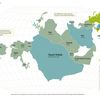30.10.2008 | 14:33
Iceland raises interest rates to secure loan
Iceland raised interest rates to a record 18 per cent from 12 per cent yesterday as a condition of a proposed $2bn loan from the International Monetary Fund to help rescue the stricken country.
Iceland applied to the Washington-based organisation for the emergency loan after its banking system collapsed and is seeking another $4bn (€3.2bn, £2.6bn) from some Nordic and other central banks.
The application will be presented to the IMF's board tomorrow and the central bank said a condition attached to the loan was for a rate rise to 18 per cent.
The move reversed a 3.5 per cent rate cut announced just two weeks ago by David Oddsson, central bank governor, underlining the influence the IMF now has over policymaking in Iceland.
Brian Coulton, managing director at Fitch Ratings, the credit ratings agency, said Iceland's central bank had "no choice but to work very closely with the fund".
Following the collapse of the banking system, the Icelandic economy is expected to contract by up to 10 per cent, unemployment to rise at about 8 per cent and inflation to hit 20 per cent or more, economists say.
"Putting up interest rates means they are going to go through the mother of all recessions, but the key is stability," Mr Coulton said.
The IMF-led rescue represents an important breakthrough for Iceland as it strives to stabilise its economy by clearing the way for other countries to come to its aid. But it has come at the price of agreeing to the organisation's demands. The IMF conditions attached to the loan are to restore confidence in the economy and stabilise the Icelandic krona, restore fiscal sustainability and re-establish a viable banking system.
Yesterday's rate rise was an important first step towards boosting the credibility of the Icelandic krona, which lost 70 per cent of its value during the crisis before trading dried up amid the uncertainty.
The IMF and Icelandic government have agreed that the currency should refloat within a matter of weeks, regarded as a vital step in restoring Iceland's international credibility and helping the international payment system to restart.
"It is of overarching importance to restore stability in the foreign exchange market and support the exchange rate of the crown," Sedlabanki, the central bank, said.
The huge interest rate rise came as Iceland continued to try to rally international support for multi-billiondollar loans to bolster its foreign exchange reserves, a move that should also help support its currency once it resumes trading.
The office of Geir Haarde, prime minister, told the Financial Times yesterday Iceland had sent an application for funds to the US Federal Reserve and the European Central Bank and had also been in contact with the Bank of Japan via its embassy in Tokyo.
The Icelandic krona is expected to be floated again as soon as is practical - possibly within the next two weeks - once the IMF's board has approved the $2bn loan.
By David Ibison in Stockholm
Published: October 29 2008 02:00 | Last updated: October 29 2008 02:00
Um bloggiš
Baldur Fjölnisson
Nżjustu fęrslur
- Torfi Stefįns bannašur ęvilangt
- OL ķ skįk. Landinn malaši Kenķu ķ 9. umferš
- OL ķ skįk: Landinn ķ 88. sęti eftir 8 umferšir
- Mešaljónar ķ skįkinni
- Baggalśtur - Sagan af Jesśsi
- Eitraš fyrir lżšnum?
- Óvenjulega döpur taflmennska innfęddra einkennir Reyjavķkursk...
- U.S. Rushes Coolant to Japanese Nuke Plant After Earthquake
Heimsóknir
Flettingar
- Ķ dag (5.10.): 0
- Sl. sólarhring:
- Sl. viku: 6
- Frį upphafi: 0
Annaš
- Innlit ķ dag: 0
- Innlit sl. viku: 5
- Gestir ķ dag: 0
- IP-tölur ķ dag: 0
Uppfęrt į 3 mķn. fresti.
Skżringar
Bloggvinir
-
 Agný
Agný
-
 Alfreð Símonarson
Alfreð Símonarson
-
 Andrea J. Ólafsdóttir
Andrea J. Ólafsdóttir
-
 Bjarni Harðarson
Bjarni Harðarson
-
 Bjarni Kjartansson
Bjarni Kjartansson
-
 Björgvin Gunnarsson
Björgvin Gunnarsson
-
 Brynjar Jóhannsson
Brynjar Jóhannsson
-
 FLÓTTAMAÐURINN
FLÓTTAMAÐURINN
-
 Eygló Þóra Harðardóttir
Eygló Þóra Harðardóttir
-
 FreedomFries
FreedomFries
-
 Fríða Eyland
Fríða Eyland
-
 Félag um stafrænt frelsi á Íslandi
Félag um stafrænt frelsi á Íslandi
-
 Georg P Sveinbjörnsson
Georg P Sveinbjörnsson
-
 Gestur Guðjónsson
Gestur Guðjónsson
-
 Gils N. Eggerz
Gils N. Eggerz
-
 Gullvagninn
Gullvagninn
-
 Gunnar Skúli Ármannsson
Gunnar Skúli Ármannsson
-
 Guðrún María Óskarsdóttir.
Guðrún María Óskarsdóttir.
-
 Gísli Hjálmar
Gísli Hjálmar
-
 Hagbarður
Hagbarður
-
 Halla Rut
Halla Rut
-
 Haraldur Haraldsson
Haraldur Haraldsson
-
 Hilmar Kári Hallbjörnsson
Hilmar Kári Hallbjörnsson
-
 Hlekkur
Hlekkur
-
 Ingibjörg Álfrós Björnsdóttir
Ingibjörg Álfrós Björnsdóttir
-
 Jens Guð
Jens Guð
-
 Jóhannes Ragnarsson
Jóhannes Ragnarsson
-
 Jón Aðalsteinn Jónsson
Jón Aðalsteinn Jónsson
-
 Jón Ragnarsson
Jón Ragnarsson
-
 Jón Steinar Ragnarsson
Jón Steinar Ragnarsson
-
 Jónína Benediktsdóttir
Jónína Benediktsdóttir
-
 Karl Tómasson
Karl Tómasson
-
 Kári Magnússon
Kári Magnússon
-
 Loopman
Loopman
-
 Magnús Þór Hafsteinsson
Magnús Þór Hafsteinsson
-
 Promotor Fidei
Promotor Fidei
-
 Rúnar Sveinbjörnsson
Rúnar Sveinbjörnsson
-
 Salvör Kristjana Gissurardóttir
Salvör Kristjana Gissurardóttir
-
 Sandra María Sigurðardóttir
Sandra María Sigurðardóttir
-
 SeeingRed
SeeingRed
-
 Sigurbjörn Friðriksson
Sigurbjörn Friðriksson
-
 Sigurjón Þórðarson
Sigurjón Þórðarson
-
 Sigurður Þórðarson
Sigurður Þórðarson
-
 Snorri Hrafn Guðmundsson
Snorri Hrafn Guðmundsson
-
 el-Toro
el-Toro
-
 Sveinn Ingi Lýðsson
Sveinn Ingi Lýðsson
-
 Tryggvi Hjaltason
Tryggvi Hjaltason
-
 TómasHa
TómasHa
-
 Túrilla
Túrilla
-
 Upprétti Apinn
Upprétti Apinn
-
 gudni.is
gudni.is
-
 haraldurhar
haraldurhar
-
 proletariat
proletariat
-
 Ívar Pálsson
Ívar Pálsson
-
 Ómar Ragnarsson
Ómar Ragnarsson
-
 Ónefnd
Ónefnd
-
 Óskar
Óskar
-
 Óskar Helgi Helgason
Óskar Helgi Helgason
-
 Óskar Þ. G. Eiríksson
Óskar Þ. G. Eiríksson
-
 Þórir Kjartansson
Þórir Kjartansson
-
 Arnar Guðmundsson
Arnar Guðmundsson
-
 Bara Steini
Bara Steini
-
 Birgir R.
Birgir R.
-
 Birgir Rúnar Sæmundsson
Birgir Rúnar Sæmundsson
-
 brahim
brahim
-
 Brosveitan - Pétur Reynisson
Brosveitan - Pétur Reynisson
-
 Bwahahaha...
Bwahahaha...
-
 Dingli
Dingli
-
 eysi
eysi
-
 Gestur Kristmundsson
Gestur Kristmundsson
-
 Guðbjörg Elín Heiðarsdóttir
Guðbjörg Elín Heiðarsdóttir
-
 Gunnar Helgi Eysteinsson
Gunnar Helgi Eysteinsson
-
 Gunnar Rögnvaldsson
Gunnar Rögnvaldsson
-
 Helgi Jóhann Hauksson
Helgi Jóhann Hauksson
-
 Hlini Melsteð Jóngeirsson
Hlini Melsteð Jóngeirsson
-
 Jakobína Ingunn Ólafsdóttir
Jakobína Ingunn Ólafsdóttir
-
 Katrín Snæhólm Baldursdóttir
Katrín Snæhólm Baldursdóttir
-
 kreppukallinn
kreppukallinn
-
 Kristín Magdalena Ágústsdóttir
Kristín Magdalena Ágústsdóttir
-
 Máni Ragnar Svansson
Máni Ragnar Svansson
-
 Morgunblaðið
Morgunblaðið
-
 Neo
Neo
-
 Orgar
Orgar
-
 Ragnar L Benediktsson
Ragnar L Benediktsson
-
 Rauði Oktober
Rauði Oktober
-
 Skákfélagið Goðinn
Skákfélagið Goðinn
-
 Sveinn Þór Hrafnsson
Sveinn Þór Hrafnsson
-
 Vilhjálmur Árnason
Vilhjálmur Árnason
-
 Þór Ludwig Stiefel TORA
Þór Ludwig Stiefel TORA





Bęta viš athugasemd [Innskrįning]
Ekki er lengur hęgt aš skrifa athugasemdir viš fęrsluna, žar sem tķmamörk į athugasemdir eru lišin.